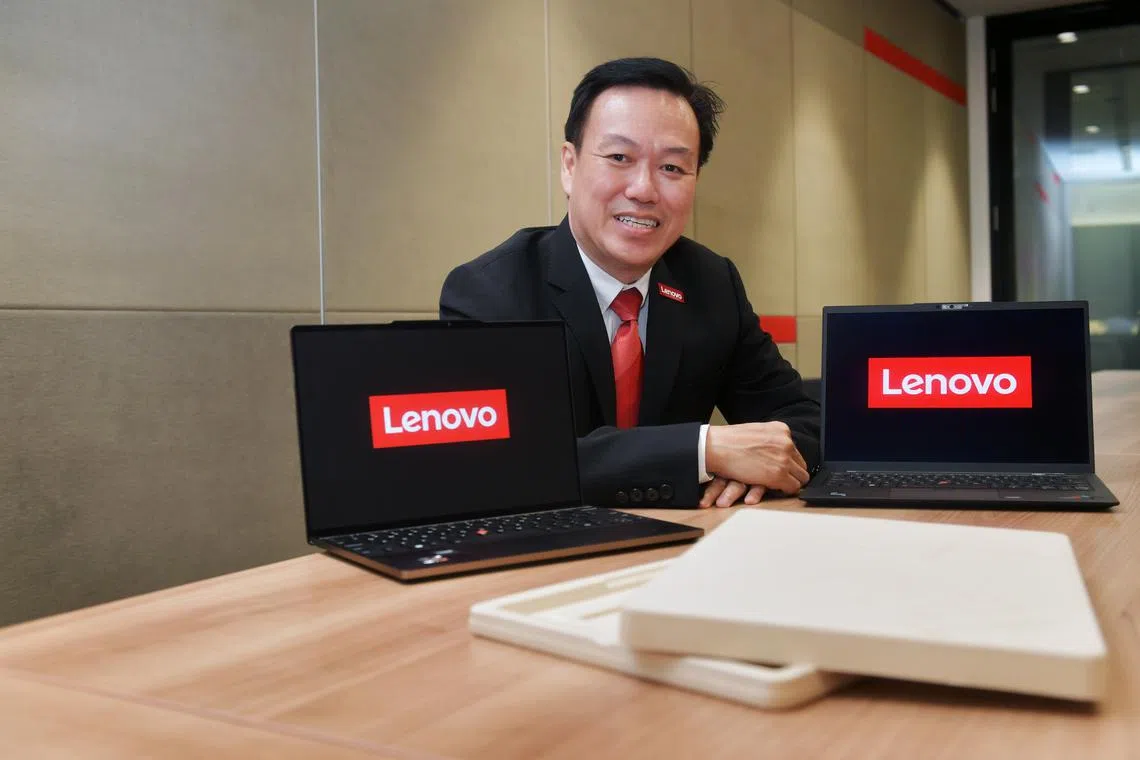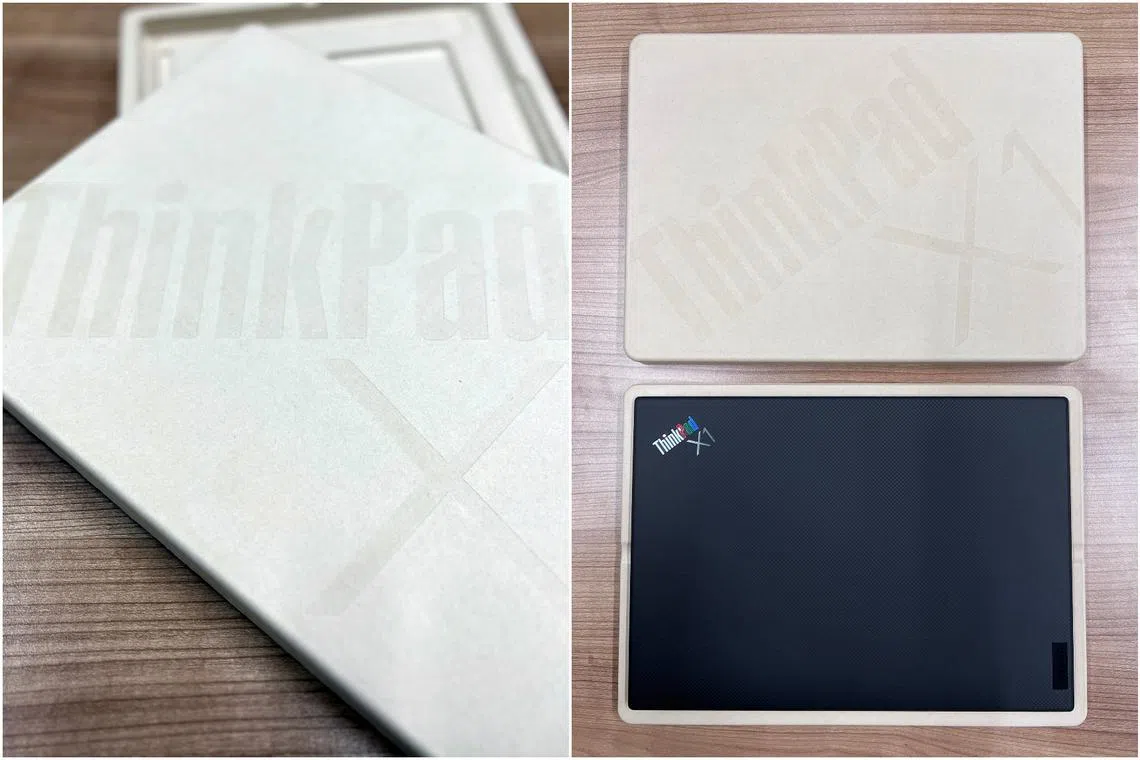Tech manufacturers step up recycling efforts to meet regulatory targets
Sign up now: Get ST's newsletters delivered to your inbox

Lenovo General manager Nigel Lee with Lenovo laptops and their eco packaging.
ST PHOTO: ALPHONSUS CHERN
Follow topic:
SINGAPORE - Technology manufacturers are in a race against time to meet regulatory requirements and sustainability goals.
The pressure to overhaul manufacturing, which is estimated to produce a fifth of the world’s carbon emissions, has resulted in more recycled materials being used in consumer tech products.
Lenovo ThinkPad laptops are a common sight among office staff here, and the firm’s sustainability-focused devices released in 2022 – the ThinkPad Z13 and Z16 – are a break from ThinkPads typically built with black plastic.
The devices’ metal chassis are forged with 75 per cent recycled aluminium – new in Lenovo’s product line. They are lined with vegan leather, made mostly of recycled plastic. Their power adapters are made mostly of recycled plastic, and the packaging is made completely from renewable bamboo and sugarcane fibres.
The two laptop models are the manufacturer’s first steps to overhauling its computer line-up, which will use only recycled content by 2026, said Lenovo general manager Nigel Lee.
The firm has also launched a laptop exchange service to collect used Lenovo laptops for recycling to create a sustainable product cycle, said Mr Lee.
These sustainability efforts come as industry regulations loom to crack down on the more than 60,000 tonnes of electronic waste generated in Singapore each year, according to statistics by the National Environment Agency.
Mr Lee cited the Resource Sustainability Act, which pins the responsibility on producers to collect and treat their products when these reach their end of life.
Under the Act, producers are required to handle e-waste from the products and extract valuable resources from them.
The pressure is mounting globally as similar laws on electronic waste are being discussed in Europe. The European Commission is in talks to require the collection and treatment of e-waste and will hold a public consultation on the matter in the first quarter of 2023.
Singapore could also speed up its plans on raising the carbon tax rate, with the current $5 per tonne rate already set to rise to $25 from 2024, with a view to having it reach $80 by 2030.
A similar trend is seen in the European Union, with countries scaling up carbon tax rates that are already as high as $180 per tonne in Sweden.
Firms will lose out on business if they do not implement sustainability measures fast, as supply chain partners and contractors are increasingly competitive in this field, Mr Lee said.
“If you want to be in the game, you need to follow the industry’s environmental goals... Otherwise, you will lose out.”
Since last year, Lenovo has doubled the number of products that use post-consumer recycled (PCR) materials to 248, en route to its goal of net-zero emissions by 2050, it reported in August.

Lenovo’s metal chassis are forged with 75 per cent recycled aluminium and the packaging is made completely from renewable bamboo and sugarcane fibres.
ST PHOTOS: ALPHONSUS CHERN
But Mr Lee said the shift is not an overnight effort as all players in the supply chain, such as those that develop recycled materials and facilitate transportation services, must play ball.
Taiwanese tech manufacturer Acer launched its first sustainability-focused laptop in 2021, the Acer Aspire Vero, which has a chassis made with 30 per cent PCR material – one of the highest proportions used in its products.
While Acer has used PCR content selectively in its earlier models, the Vero marks its first attempt to infuse PCR materials across its build, such as its body, display and keyboard.
The Vero serves as a guide for building laptops out of recycled materials in the future, said Acer industrial design director Henry Huang.
This is estimated to cut the laptop’s carbon footprint by one-fifth compared with normal plastic, said Acer, which recorded 45 per cent renewable energy use last year as part of its target to switch fully to renewable energy by 2035.
The Vero posed an “engineering challenge” for its research and development (R&D) team as PCR content is weaker than normal plastic, requiring reinforcements and a greater thickness to ensure the device survived Acer’s drop tests, Mr Huang said.
Greening products incurs higher R&D and material costs, but it is essential to do so as sustainability has become a global focus, said Acer corporate sustainability officer Grace Liu.
“Consumers buying products are telling us that they don’t just think about the price – they also want value in sustainability,” she said.
Phone makers such as Google have been ramping up the use of eco-friendly materials too. Eleven per cent of the new Google Pixel 7 phones’ weight comprises recycled content, including its frame made entirely out of recycled aluminium.
Google also lengthened security updates for its phones, with five years of security updates guaranteed from launch. This is roughly two years more than what is guaranteed by most Android phone makers, a move which Google said will help boost the devices’ longevity.
The charging brick was also removed from the box to be “more minimal”, Google told The Straits Times.
Samsung’s flagship phone series and Apple iPhones have similarly stopped carrying chargers in the box. The iPhone’s boxes are considerably smaller, allowing more sets to fit into a shipping pallet, Apple announced at the iPhone 12’s launch in 2020.
But the industrywide move to drop chargers has been criticised by some as a marketing gimmick.
In a video that had garnered nine million views as at Monday, British YouTuber Arun Rupesh Maini – better known as Mrwhosetheboss – criticised the move as simply passing the burden to other firms. He said consumers who need a charger will simply order from third-party manufacturers, leading to more deliveries and packaging.
Apple also faces pressure to switch the charging ports of future iPhones to USB-C
This is to reduce waste and the chargers needed for multiple devices, as USB-C cable is the wire of choice for most Android devices, iPads and MacBooks.
Sustainable manufacturing is a fundamental part of meeting net-zero goals as industries make up nearly half of the nation’s emissions, said Ms Clara Chen, founding managing partner of Singapore Deep-Tech Alliance. The venture capital firm works with start-ups to reduce their environmental footprint.
The challenge is the availability of materials and costs, especially for small and medium-sized enterprises here, said Ms Chen, adding that recycled metals, for example, incur high costs of innovation.
But companies have to keep up as sustainability is a key requirement of many prospective business partners, as well as new hires in the market.
Ms Chen said: “The costs are too big. If you don’t qualify, there goes talent, revenue and other opportunities in the market.”

